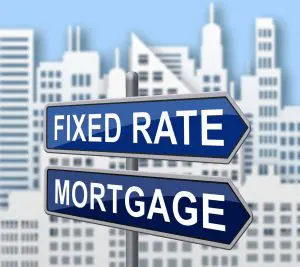A fixed-rate mortgage has an interest rate that does not change throughout the loan’s life, typically 10-30 years. For this reason, fixed-rate mortgages are the most popular type of home loan.
Amortized and Non-Amortized Fixed-Rate Mortgages
Fixed-rate mortgages are either amortized or non-amortized loans.
Amortized Fixed-Rate Mortgage
The monthly payment for an amortized loan is always the same. A portion of each payment is applied to the loan’s interest and principal.
The benefit of an amortized fixed-rate mortgage is the predictability. Borrowers receive an amortization schedule that shows the monthly payment details from start to finish, so they know the payment amount applied to interest and principal.
When reviewing an amortization schedule, you will notice that most of the monthly payment initially goes toward interest. However, since a portion of each payment is applied to the principal, less of each successive payment goes toward interest, and more goes toward principal until the balance is fully paid.
Related: Understand Your Mortgage Amortization Schedule and Save Money
Non-Amortized Fixed-Rate Mortgage
A non-amortized fixed-rate loan is usually in the form of a balloon-payment loan or interest-only loan.
Balloon-payment loans are often structured with deferred interest payments. Interest is calculated annually based on the borrower’s annual interest rate. Interest is then deferred and added to a lump sum balloon payment.
Interest-only fixed-rate loans are structured so that borrowers only pay interest in scheduled payments, usually monthly. Then at a specified date, borrowers begin to pay principal in addition to interest.
Fixed-Rate vs. Adjustable-Rate Mortgages
Although some adjustable-rate mortgages may keep a consistent interest rate for a short time, they fundamentally differ from fixed-rate mortgages.
Fixed-rate mortgages stay at the same rate over the loan’s entire life. In contrast, adjustable-rate mortgages change at predetermined adjustment periods, reflecting current interest rates and the added lender margin.
There is more risk involved with an adjustable-rate mortgage. Because the interest rate is variable, payments may increase or decrease over time to reflect rate changes. For this reason, borrowers often use an adjustable-rate mortgage for a shorter term.
Fixed-rate mortgages are considered more stable and less risky. A 30-year fixed-rate mortgage is the industry standard in the U.S., providing buyers with consistent payments at a predictable interest rate over the loan’s life.
Refinance a Fixed-Rate Mortgage if Interest Rates Fall
The upside of a fixed-rate mortgage is that the interest rate does not rise, even if financial market rates increase. However, the downside of a fixed-rate mortgage is that the interest rate does not decrease, even when rates in financial markets fall.
In the case of falling interest rates, the solution for borrowers with a fixed-rate mortgage is to refinance their mortgages.
Though there is an expense associated with refinancing, borrowers feel that a fixed-rate mortgage’s stability and security outweigh the risk of an adjustable-rate mortgage. Therefore, refinancing a fixed-rate mortgage when rates fall is a welcome option that can save thousands of dollars over the life of a loan.
Related: Refinancing Your Mortgage Could Save You Money
Marimark Mortgage
Marimark Mortgage is based in Tampa, Florida, and serves the mortgage needs of homebuyers, homeowners, and investors in Florida, Virginia, and Pennsylvania.
We specialize in conventional home mortgages, FHA, VA, and USDA mortgage options, refinance loans, and reverse mortgages. We’ve worked extensively with cash-out refinancing and helped clients lower their monthly mortgage payments on both amortized and non-amortized fixed-rate mortgages.
To get started with a mortgage to buy your next home, please fill out our Quick Mortgage Application, or contact us directly.

The Marimark Mortgage Newsletter will keep you informed with important events in the mortgage industry that could impact your finances.
We especially focus on ways to save money on your current and future mortgages. And, we continually share the information we share with our clients, because we believe informed consumers are the best consumers.
Real estate agents, and other professionals in the industry, will receive an ongoing wealth of information that will help them serve their clients.
